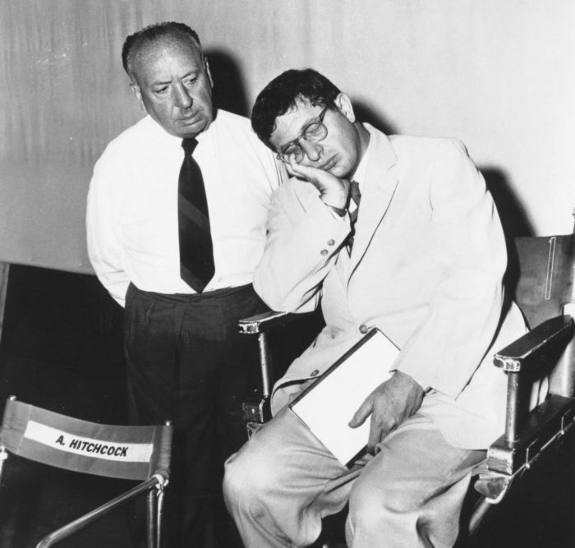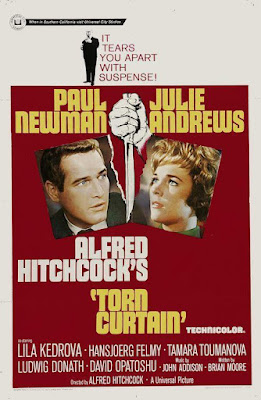The successful collaboration between director Alfred Hitchcock and music composer Bernard Herrmann abruptly ended over Torn Curtain (1966). The two men had worked together on eight films, with Herrmann composing the score for The Trouble with Harry (1955), The Man Who Knew Too Much (1956), The Wrong Man (1956), Vertigo (1958), North by Northwest (1959), Psycho (1960) and Marnie (1964). On The Birds (1963), which doesn't have actual music but natural and electronic bird sounds, Herrmann had served as a sound consultant. Following Marnie, Torn Curtain was the next Hitch-Herrmann project but artistic differences led Hitchcock to eventually fire Herrmann, thereby ending their longtime collaboration and friendship.
DEAR BENNY
TO FOLLOW UP PEGGYS CONVERSATION WITH YOU LET ME SAY AT FIRST I AM VERY ANXIOUS FOR YOU TO DO THE MUSIC ON TORN CURTAIN STOP I WAS EXTREMELY DISAPPOINTED WHEN I HEARD THE SCORE OF JOY IN THE MORNING NOT ONLY DID I FIND IT CONFORMING TO THE OLD PATTERN BUT EXTREMELY REMINISCENT OF THE MARNIE MUSIC IN FACT THE THEME WAS ALMOST THE SAME STOP UNFORTUNATELY FOR WE ARTISTS WE DO NOT HAVE THE FREEDOM THAT WE WOULD LIKE TO HAVE BECAUSE WE ARE CATERING TO AN AUDIENCE AND THAT IS WHY YOU GET YOUR MONEY AND I GET MINE STOP THIS AUDIENCE IS VERY DIFFERENT FROM THE ONE TO WHICH WE USED TO CATER IT IS YOUNG VIGOROUS AND DEMANDING STOP IT IS THIS FACT THAT HAS BEEN RECOGNIZED BY ALMOST ALL OF THE EUROPEAN FILM MAKERS WHERE THEY HAVE SOUGHT TO INTRODUCE A BEAT AND A RHYTHM THAT IS MORE IN TUNE WITH THE REQUIREMENTS OF THE AFORESAID AUDIENCE STOP THIS IS WHY I AM ASKING YOU TO APPROACH THIS PROBLEM WITH A RECEPTIVE AND IF POSSIBLE ENTHUSIASTIC MIND STOP IF YOU CANNOT DO THIS THEN I AM THE LOSER STOP I HAVE MADE UP MY MIND THAT THIS APPROACH TO THE MUSIC IS EXTREMELY ESSENTIAL I ALSO HAVE VERY DEFINITE IDEAS AS TO WHERE THE MUSIC SHOULD GO IN THE PICTURE AND THERE IS NOT TOO MUCH STOP SO OFTEN HAVE I BEEN ASKED FOR EXAMPLE BY [DIMITRI] TIOMKIN TO COME AND LISTEN TO A SCORE AND WHEN I EXPRESS MY DISAPPROVAL HIS HANDS WERE THROWN UP AND WITH THE CRY OF QUOTE BUT YOU CANT CHANGE ANYTHING NOW IT HAS ALL BEEN ORCHESTRATED UNQUOTE IT IS THIS KIND OF FRUSTRATION THAT I AM RATHER TIRED OF BY THAT I MEAN GETTING MUSIC SCORED ON A TAKE IT OR LEAVE IT BASIS STOP ANOTHER PROBLEM THIS MUSIC HAS GOT TO BE SKETCHED IN AN ADVANCE BECAUSE WE HAVE AN URGENT PROBLEM OF MEETING A TAX DATE STOP WE WILL NOT FINISH SHOOTING UNTIL THE MIDDLE OF JANUARY AT THE EARLIEST AND TECHNICOLOR REQUIRES THE COMPLETE PICTURE BY FEBRUARY FIRST
SINCERELY
HITCH
_____
ALFRED HITCHCOCK
DELIGHTED COMPOSE VIGOROUS BEAT SCORE FOR TORN CURTAIN ALWAYS PLEASED HAVE YOUR VIEWS REGARDING MUSIC FOR YOUR FILM PLEASE SEND SCRIPT INDICATING WHERE YOU DESIRE MUSIC CAN THEN BEGIN COMPOSING HERE WILL BE READY RECORD WEEK AFTER FINAL SHOOTING DATE GOOD LUCK
BERNARD
Source of both telegrams: Hitchcock's Notebooks: An Authorized And Illustrated Look Inside The Creative Mind Of Alfred Hitchcock (1999) by Dan Auiler.
 |
| The seven Hitchcock films that were scored by Bernard Herrmann, my favourite scores being Vertigo and Marnie. |



No comments:
Post a Comment